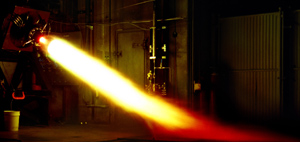Rocket Engine Ignition
Reliable and repeatable ignition of main stage propellants is crucial to the operation of every propulsion system: from R&D test articles to the next generation of launch vehicles. IN Space’s innovative solutions combined with its years of ignition experience can fulfill this critical requirement for your propulsion systems today.

Ignition Research
New ignition solutions are of continual interest due to the never-ending pursuit of higher performing propellants, the increasingly strict power and mass limitations imposed by the decreasing size of vehicles, and the rising costs of storing and transporting solid propellant igniters. Fortunately, our engineers love a challenge. If you are looking for a means to ignite the next best propellant combination or are in need of igniting more common propellants in a new way, we can help. Our ignition expertise includes torch igniters, hypergolic and catalyzed propellants along with the associated liquid propellant injectors and appropriate startup sequences to achieve stable and efficient combustion, and thermally-ignited propellants such as in systems utilizing the auto-ignited staged combustion process. We have put our ignition knowledge to use to find effective and reliable solutions for government, industry and academic programs.
Torch Igniters
IN Space provides dependable ignition systems to fit within a variety of vehicle and system requirements at any stage of a propulsion system’s development cycle. IN Space igniters have operated at pressures over 1000 psi and with propellant combinations ranging from oxygen/hydrogen to oxygen/methane and hydrogen peroxide/hydrocarbon fuels. Whether it’s supplying a laboratory-scale torch for the early stages of a research and development program or a flightweight igniter for an engine prototype, IN Space engineers can work with you to identify, design, and implement an ignition solution to work within your requirements.
Torch Ignition Modeling
To aid in design efforts and computational simulations of the combustion process, IN Space, LLC has co-developed a computer model to predict the main combustion chamber operating conditions during the startup transient initiated by a torch igniter. The physics-based model primarily outputs the time-varying main chamber pressure and reacting zone volume to assist engine designers in determining the igniter characteristics and main propellant flow parameters that will avoid destructive hard-starts and overpressures or unacceptably long startup durations. Customizable based on propellant fluid properties and flow rates as well as the geometries of the main chamber and igniter, the model can be applied a wide variety of torch-ignited propulsion systems.

